The ‘Papa’ of over 700 stray dogs is now giving canine soldiers the retired life they deserve
Instead of spending the last years of their lives confined in kennels, retired service dogs are now finding their way to this man’s dog sanctuary, where they are receiving the medical and emotional attention they need.
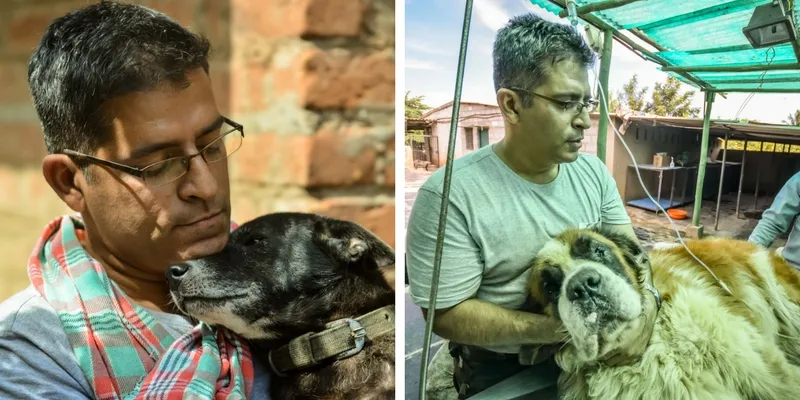
In 2016, a four-year-old Labrador called Mansi was posthumously honoured with a bravery award for her services in the Army’s tracker dog unit after she lost her life in an encounter. Similarly, Rocket, a Belgian Malinois, was recommended for a gallantry award for his remarkable work with the National Security Guard Commando Team that brought down terrorists at the Panthankot Air Force Station.
Mansi and Rocket are just two among thousands of our canine soldiers who serve the country from the tender age of two months. They are trained for explosive detection, guarding bases, search and rescues, and infantry patrol, among various other specialities. The love and respect they receive is possibly greater than that received by our men in uniform.
This is why it came as a shock to the population when an RTI query addressed to the Army in 2015 — What happens to Indian Army dogs, including the decorated ones, once they are not fit to carry out their rigorous duty? — received the information that they are euthanised. Soon after this, the Centre put an end to this practice and stated that retired service dogs are now to be rehabilitated.
While the country rejoiced at this news, Rakesh Shukla, the man who houses over 700 stray and abandoned dogs on his farm, began receiving rescue calls. But these were not the strays he was used to. They were old, retired service dogs who had served in the Mangalore Police Force, and who were now confined in kennels.
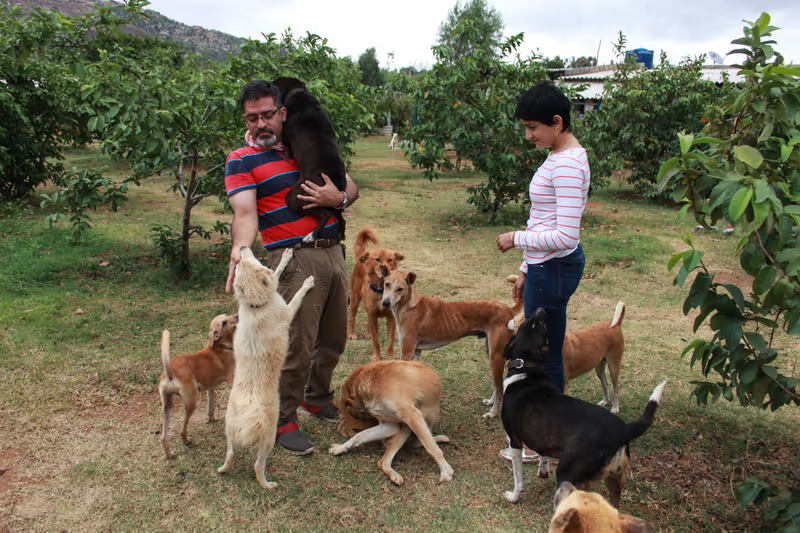
“The active units cannot care for these dogs simply because they are active. They have to cater to the training of younger dogs joining the force. And since these old dogs can no longer be euthanised, they are sent to kennels,” he explains.
“But this is no way for them to live,” he insists. And so, the ‘Dog Father’, as he has now come to be known after over 7,000 rescues, opened his doors to these patriot dogs, to give them a retired life they deserve.
How a dog sanctuary came to be
Rakesh has always been a businessman, travelling and working around the world before he started his own company in Bengaluru. A life never shared with dogs changed when he brought home a 45-day-old Golden Retriever in 2009. A few months later, while walking his new love, Rakesh chanced upon a stray puppy that had barely survived the rains. He recalls that rescuing this dog, whom he aptly named ‘Lucky’, was the beginning of it all.
“What started off as one dog became 10, which became 100,” and before he knew it, Voice of Stray Dogs (VOSD) was a registered organisation for stray rescue and rehabilitation located in the outskirts of Bengaluru. VOSD is now four years old and four acres of wagging tails.
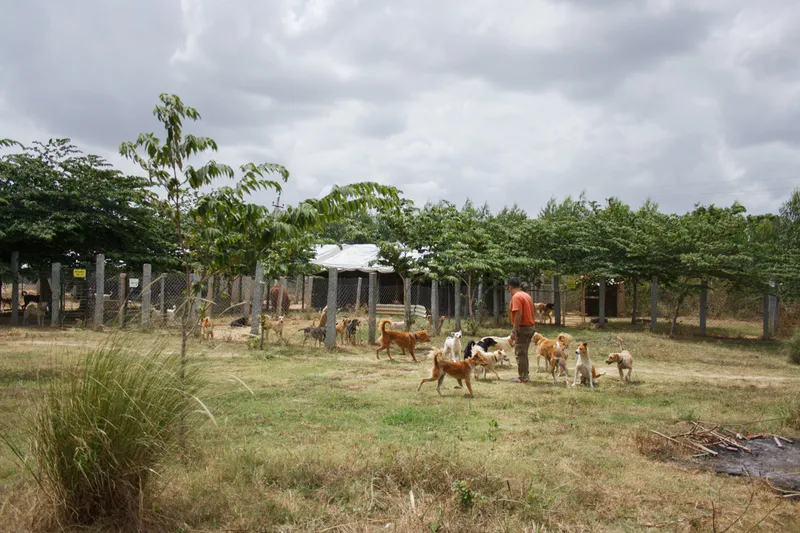
Rakesh is a no-nonsense man, and with the skills acquired from running his own company, he seriously took on the task of scaling his organisation. With over 90 percent of funds coming from his own tech firm, TWB, he laid out the resources, infrastructure, and technology that were needed to create a system of rescues.
“If a system has to survive, everything has to be reproducible and repeatable,” says the businessman in this 46-year-old dog lover. VOSD now has the capacity to house dogs that can never be released or adopted, due to their mental, physical, or medical conditions. “Where would these dogs go? I had to create a space for them, and that’s what VOSD is,” he explains.
And now that the doors are open to service dogs, VOSD is entering a whole new ball game.
Why our patriot dogs need special care
As Rakesh explains, service dogs become used to a strict regimen through their eight to 10 years of service. “They have been on a leash their entire lives, and get bewildered when they are not anymore. They are used to rigorous physical activity and need at least three walks a day. They spend most of their lives with just one or maybe two handlers, and so, are not used to too many dogs and people.”
Adding to this is their deteriorating health, which is usually the primary reason for their dismissal from the force. Ankur, a 10-year-old dog who came to Rakesh a few days ago, suffers from a malignant cancer and is now in palliative care. On the other hand, Shaurya, a 10-month-old Lab, suffers from a congenital heart disease and needs daily medication for the rest of his life.
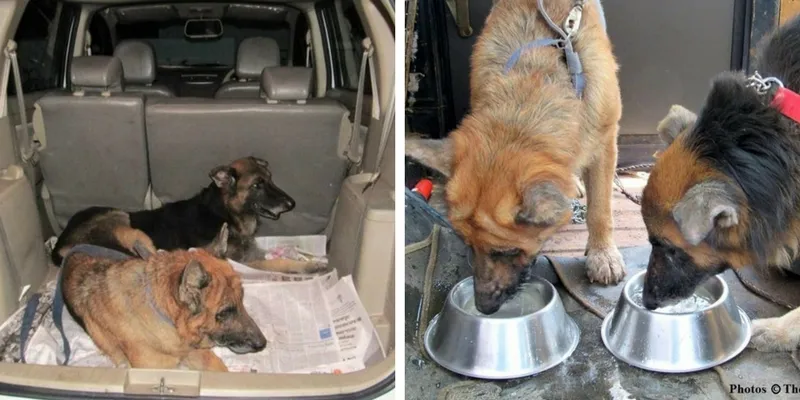
“When these dogs are dismissed from duty, they have a medical diagnosis, but no medical attention,” he reveals. Moreover, the physical trauma is exacerbated by the mental trauma that comes with a separation from the environment and routine they are used to. This makes them very difficult to be adopted as they are not "cute and cuddly anymore,” for most people, at least.
How VOSD has come to the rescue
“The first few service dogs that came to us were in a very bad condition. They were depressed from solitary confinement, their food intake had changed, and they suffered from arthritis,” he says. He adds, however, that there is no worry now, because of the 15 dogs they have so far received, most have retired directly to VOSD.
Rakesh has been in constant touch with units like the Central Industrial Security Force, the Railway Police Force, and the Karnataka and Kerala Police Force, among others, to ensure that these dogs don’t spend months confined in kennels before reaching the VOSD sanctuary.
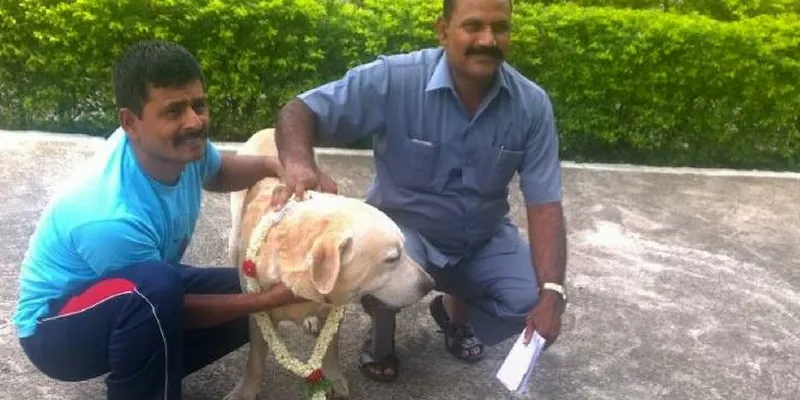
“Our aim is to ease their transition into a retired life,” he says. He plans to build a 10,000 sqft enclosure specifically for them, which will be purpose-built with obstacle courses. To create a greater semblance of the life they’re used to, along with hiring more vets stationed at the sanctuary, he plans to hire people from the army units, as these dogs are used to an army environment.
“We have a no-kill policy here, which means that all the dogs that come to us are here for life,” Rakesh says. With this, he points to how operational costs are always sky high. “It costs about Rs 2,000 a month to care for one senior dog, while we are already treating over 4,000 strays in a year. And that is just the medical expenses. And there will be more service dogs coming in and staying here for life.”
At the moment, 95 percent of funds for VOSD’s operational costs flow from his company, but Rakesh stresses that scaling and funding will only get more challenging. For this reason, he has launched a #PatriotDogs campaign, through which he hopes to crowdsource funds much needed for the personalised care these dogs need.
“I’m dog lover, everybody’s a dog lover, but I don’t use that term very loosely — what will you do with that love?” The question he challenged himself with is what he now expects his fellow dog lovers to ask themselves.







